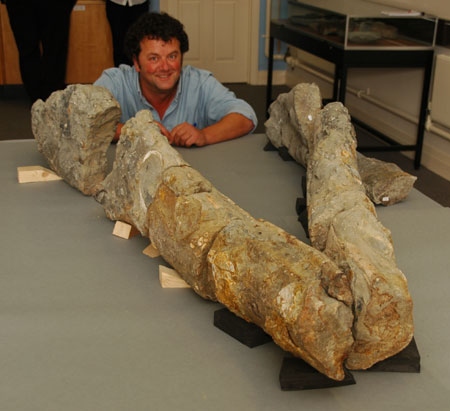During Autumn 2009 the eyes of the world turned towards the Jurassic Coast when the discovery of a fossilised pliosaur skull, a massive marine reptile was announced.
 The story was covered by British television, radio and newspapers and also generated a huge amount of interest all over the globe from Brazil to Hungary, from Canada to Australia.
The story was covered by British television, radio and newspapers and also generated a huge amount of interest all over the globe from Brazil to Hungary, from Canada to Australia.
The skull, measuring 2.4 metres in length was discovered in Weymouth Bay and may be the largest, most complete skull ever unearthed of the most powerful predator ever to live on earth. The creature lived in the warm Jurassic seas over 150 million years ago and probably measured about 15 metres in length.
Over the next year skilled fossil preparators will clear the loose rock matrix from the fossil as scientists researching the creature’s fascinating story alongside them. It is also likely that a documentary will be made bringing this amazing story to a new audience.
When the fossil is prepared it will be donated to the Dorset County Museum, where it will take pride of place in the Museum’s ‘Jurassic Coast Gallery’.
The pliosaur skull is only one part of the Jurassic Life project funded by the Heritage Lottery Fund and Dorset and Devon County Councils. Over £220,000 has been committed to purchasing and displaying the wonderful fossils discovered along the Jurassic Coast in Accredited museums. So far small displays have been created in Wareham, Portland, Honiton and Budleigh Salterton Museums. Larger displays are in the pipeline over the next 18 months for Lyme Regis Museum, Sidmouth Museum, Bridport Museum as well as Dorset County Museum.
Lyme Regis will receive a marvellous fossilised fish the size of a car tyre and a plesiosaur, Bridport a disarticulated plesiosaur discovered at Golden Cap. Sidmouth Museum in East Devon will receive small but incredibly important fragments of the dog-sized reptiles that lived in the red desert of Triassic Eat Devon, including the wonderful fossilised jaw of a 220 million year old desert predator.
When ‘Jurassic Life’ is completed residents and visitors will for the first time be able to see evidence of the fantastic creatures that once lived in our warm Jurassic seas and baking Triassic desert in local museums.
David Tucker,
Dorset County Museums Adviser 23.12.09






